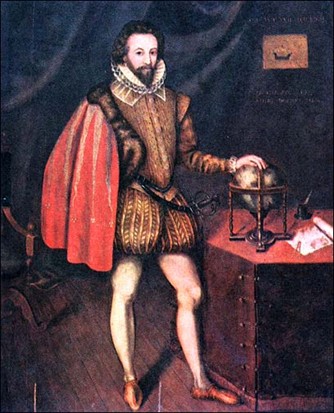Elizabethan Protestantism injected new force into English
social, political, and economic development. Anti-Catholic
sentiment in England was, by definition, anti-Spanish.
A Spanish monarch was the emperor in Europe, and the Spanish
monarchy controlled the papacy and spread the hated papist religion
to the distant corners of the globe. Papal control of
commerce with the infidels of the New World was a serious rub with
the English queen and her subjects. As soon as she took
the throne, Elizabeth I set out to make sure that England got her
share of the spoils in the 'new world.'
(Click here for more)

By the time
Raleigh led his fellow Englishmen into the perilous business of
colonizing distant lands, the medieval discourses on the rights of
infidels vis a visthe enlightened European monarchs and papal
emissaries had grown into a thorny thicket. Rome's power to
impose hegemony on the princes of the continent under a uniform
Christian vision of the divine path for all mankind did not survive
the intellectual crucible of the final years of the Middle
Ages. First Francico de Vitoria, then the great Jesuit
thinker Francisco Suarez, redrew the lines of natural law, divine
law, and lay the foundation for a comprehensive law of nations to
govern relations between nation states. http://www.newadvent.org/cathen/14319a.htm
Nevertheless, their thinking still embodied many of the fundamental
precepts that were first introduced by Innocent IV, three centuries
earlier.
In the closing
decades of the 16th century, England would refuse to recognize the
pope's preeminent jurisdiction over the conquest of foreign lands
and peoples. The legal architecture that had launched the
Crusades was so embedded in the natural law precepts controlling
the discourse on conquest in center of learning, such as
Valladolid, Oxford, and Salamanca, that the ghosts of crusading
popes were the 'hands inside the puppets" of the leading thinkers
animating the debate over natural law as the Age of Discovery
unfolded.
http://www.historyguide.org/earlymod/lecture2c.html
Elizabeth and
England were a century late to the game of 'conquest and colonize,'
but they were determined to reconcile the secularized Innocentian
commentaries of Vitoria with the Reformation's endorsement of
proto-capitalist enterprises in the new world. This later
model introduced the radical idea that man's purpose in life was to
improve his material lot and to acquire wealth.
The death of
Elizabeth and the coronation of James I added new complexities to
the anti-Catholic/anti-Spanish passions of protestant England.
http://www.luminarium.org/sevenlit/james/
James brokered a treaty of peace with Spain in 1604, and hauled in
a lot of people like Sir Walter Raleigh to the Tower of London and
chopped their heads off. This gruesome business put a
temporary end to the Reformation in England, but James' actions had
unintended consequences that would long outlive his original
intentions. Neutralizing protestant rhetoric had the effect
of focusing all discourse on New World conquest on a commercial,
not theological, footing. This set back would only be
temporary, however, and in the end, Elizabeth's protestant
God would prevail.